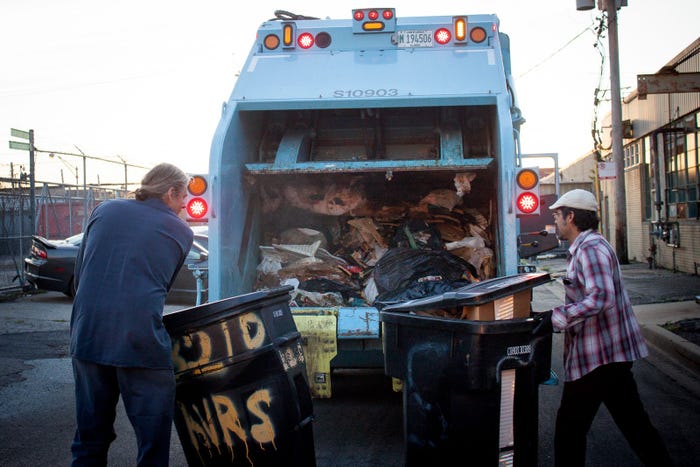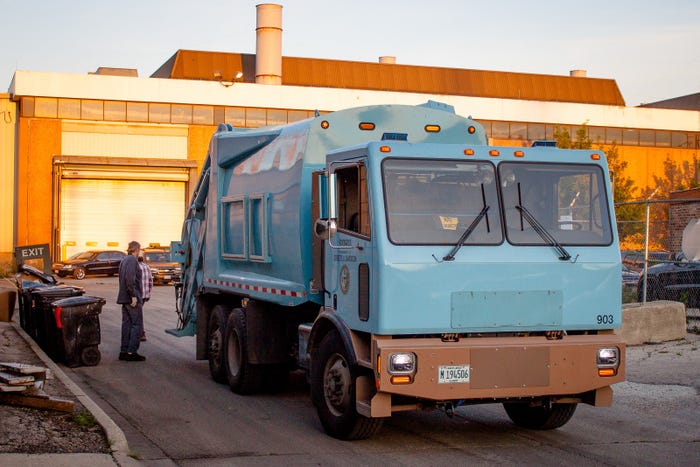Pilot to Benefit ERVs Released in Two California Cities
Several all-electric refuse vehicles (ERVs) are heading to Sacramento and Los Angeles as a continuation of a project funded by the California Energy Commission.

After a trial-and-error pilot with the City of Chicago a few years ago, several all-electric refuse vehicles (ERVs) are heading to Sacramento and Los Angeles as a continuation of a project funded by the California Energy Commission.
These Class-8 ERVs use the Motiv Power Systems All-Electric Powertrain to drive a Crane Carrier chassis, with an automated side-loader body built by Amrep Inc. The Foster City, Calif.-based Motiv powertrains are able to be installed on any chassis and provide refuse truck manufacturers the ability to quickly bring an offering to market without having to completely redesign their existing trucks.
“The impact of having an all-electric powertrain that can be installed on any chassis means that refuse truck manufacturers do not have to completely redesign their vehicles,” says Matt Chamberlain, director of product marketing for Motiv. “They can use existing chassis and engineer component locations that meet their specific needs. This has a large benefit to the industry because interested manufacturers can bring all-electric refuse trucks to market very quickly and without disrupting existing assembly lines and forcing complete body and hydraulics redesigns.”
Motiv’s powertrain uses a central control solution combined with a flexible battery power management architecture, which can be scaled depending on the route and hauling capacity needs. This allows a refuse truck manufacturer to offer a variety of trucks using a single system. Different batteries and motors can be used to optimize performance and cost based on the application’s need.
The Sacramento waste vehicle is still under construction and should be in use by the city in March or April of this year.

“Motiv approached the City of Sacramento with the offer to partner on this vehicle,” says Mark R. Stevens, fleet manager for the City of Sacramento. “The (city) was voted No. 1 Green Fleet in 2013, so I would imagine they felt our green fleet and their electric refuse truck was a good match.”
Motiv also offers a connected vehicle solution that provides vehicle diagnostic information to help operators maximize range and monitor powertrain health.
“(They also) receive over-the-air upgrades from Motiv as we continue to improve our system performance and add new features,” says Chamberlain.
These improvements stem from the challenges faced during the first pilot of an ERV to be placed into commercial operation Motiv participated in with the City of Chicago.
“The new Motiv-powered, all-electric waste vehicles that are being developed for the Department of Public Works in Sacramento and LA Sanitation have greatly benefited from the learnings of the all-electric refuse truck designed for Chicago,” says Chamberlain. “They will utilize next-generation components and redesigned architectures that resolve the challenges observed in Chicago. Where possible, Motiv is retrofitting these new components onto the Chicago truck to continuously improve its uptime.”
In 2013, Motiv led a collaboration between several refuse truck equipment suppliers to develop the first all-electric refuse truck.

Solutions were designed based on discussions with the City of Chicago about route, truck performance requirements and expected loads, according to Chamberlain. Many of the products used, including Motiv’s all-electric powertrain control system, were first-generation implementations in a Heavy Duty Class 8 application.
Commissioner David Reynolds, with the City of Chicago’s Department of Fleet and Facility Management, says the city has one truck that was to run in a variety of residential routes, including waste collections and recycling pickups.
“However, due to the unreliability of the truck, we have been unable to test it in more than a couple of applications,” he says.
Reynolds says the truck has been down more than 95 percent of the time the city has had it since 2014.
“When the truck runs, it is quiet, emits no pollutants and is similar in packer operation to the rest of our fleet,” he says. “We have one truck. The plan was to order additional trucks based on successful validation of the first unit. Due to failure of the first truck, we will not be adding any more.”
Chamberlain acknowledges that since delivery, the Chicago waste vehicle has experienced technical challenges.
“Cold weather issues with the air brake system, along with system power management and accessory issues, created unexpected faults and vehicle downtime,” he says. “In each case, Motiv and the other suppliers quickly provided replacement parts free of charge and sent resources onsite to assess and fix issues. Additionally, in some cases, new solutions have been developed with improved tolerance for more permanent solutions to the challenging vehicle operational needs and environmental conditions in Chicago.”
About the Author
You May Also Like


.png?width=300&auto=webp&quality=80&disable=upscale)